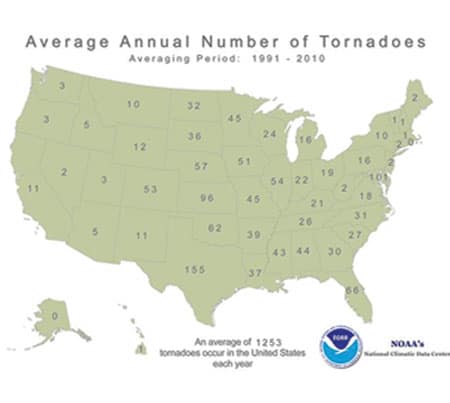Springtime is tornado season in the United States. Many people have been lulled into false sense of security by the relatively slow start this year. But once again Mother Nature flexed her muscles sending destructive storms roaring through much of the Midwest. As the cleanup of twisted metal and splintered wood continues, it’s a reminder that people in tornado prone areas need to be ever vigilant of the often deadly storms.
Are you ready? A recent survey commissioned by the Property Casualty Insurers Association of America (PCI) found 56 percent of Midwesterners consider themselves not well prepared for the aftermath of a natural disaster or severe weather.
Tornados are violent, abrupt and are often obscured by rain or darkness. Being prepared ahead of time is essential.
Here is important, potentially lifesaving information about tornados from Weather Underground:
- Develop an emergency plan for your family
- Know where safety shelters are located
- Monitor NOAA Weather Radio when severe weather is forecast
- Know the difference between a tornado watch and warning – a watch means conditions are right for tornado activity and people should be on alert, a warning means a tornado has been sighted and you should take shelter immediately
Here are tornado danger signs:
- Dark, greenish sky
- Large hail
- A large, dark, low-lying cloud that may be rotating
- A loud roar, often compared to a freight train
These are dos and don’ts from the American Red Cross if you are caught in a tornado:
- Do go immediately to an underground shelter, basement or safe room
- Do find a small windowless room in the interior of a home or hallway on the lowest level of a sturdy building
- Don’t stay in a mobile home unless absolutely necessary
- Do stay in your vehicle with the seat belt fastened and your head below the windows, covering your head with a blanket, coat or your hands
- Do go to a low lying area like a culvert or ditch if caught outdoors and cover your head with a coat or your hands
- Continue listening to local news or a NOAA Weather Radio for updated information and instructions.
- If you are away from home, return only when authorities say it is safe to do so.
- Wear long pants, a long-sleeved shirt and sturdy shoes when examining your walls, doors, staircases and windows for damage.
- Watch out for fallen power lines or broken gas lines and report them to the utility company immediately.
- Stay out of damaged buildings.
- Use battery-powered flashlights when examining buildings – do NOT use candles.
- If you smell gas or hear a blowing or hissing noise, open a window and get everyone out of the building quickly and call the gas company or fire department.
- Take pictures of damage, both of the building and its contents, for insurance claims.
- Use the telephone only for emergency calls.
- Keep all of your animals under your direct control.
- Clean up spilled medications, bleaches, gasoline or other flammable liquids that could become a fire hazard.
- Check for injuries. If you are trained, provide first aid to persons in need until emergency responders arrive.
Some common myths associated with tornados are:
- Leave windows open to equalize pressure
- Tornados don’t hit large cities
- Tornados don’t occur in mountains
- Seeking shelter under an overpass is a safe
There is new information from recent storms that sturdy garage doors may be the best protector of a home. The study of tornado damage found wood frame homes with sturdy garage doors suffered less damage than homes with flimsy garage doors.
The research from the University of Alabama also concluded that tornado shelters – underground or above ground safe rooms – saved lives.
The researchers compared damage from major tornadoes that struck Moore, Oklahoma in 2013 to studies of similar storms that hit Tuscaloosa, Alabama and Joplin, Missouri in 2011.
Some of the conclusions:
- Flimsy garage doors proved to be a weak link, allowing pressurization that destroyed supporting walls and the roof when the garage was breached by devastating winds
- Storm shelters save lives even in the worst tornadoes
- In the areas damaged by lesser winds, the garage was often the root cause for failure of residential structures, allowing roofs and supporting walls to collapse
The study found that increased building safety standards and incorporation of more storm shelters are working to prevent some damage and save lives.
If your property suffers damage from a tornado:
- Secure the property from further damage or theft
- Contact your insurance company as soon as possible
- Inventory losses and take photos
- Save receipts of meals, purchases and hotels related to not being able to live in your home
- Be careful of unscrupulous contractors
This is also a reminder how important it is to take an inventory of your home and possessions before a disaster strikes.
Another way to protect your home is with an insurance policy review. Call a California Casualty advisor today, 1.800.800.9410 or visit www.calcas.com.
This article is furnished by California Casualty, providing auto and home insurance to educators, law enforcement officers, firefighters and nurses. Get a quote at 1.800.800.9410 or www.calcas.com.
Resources for this article:
https://www.nws.noaa.gov/om/severeweather/resources/ttl6-10.pdf
https://www.redcross.org/prepare/disaster/tornado
https://www.wunderground.com/resources/severe/tornado_safety.asp?MR=1
https://esridev.caps.ua.edu/MooreTornado/Images/MooreTornadoFinalReport.pdf
- California Casualty Earns Financial Stability Rating® of A, Exceptional, From Demotech, Inc. - April 28, 2025
- Music & Arts Grant Recipients – 2024 - December 13, 2024
- Understanding Auto and Home Insurance Rate Changes - December 3, 2024

